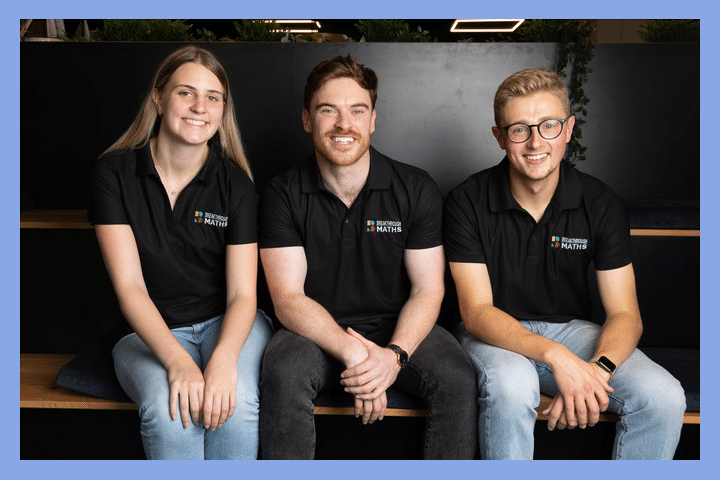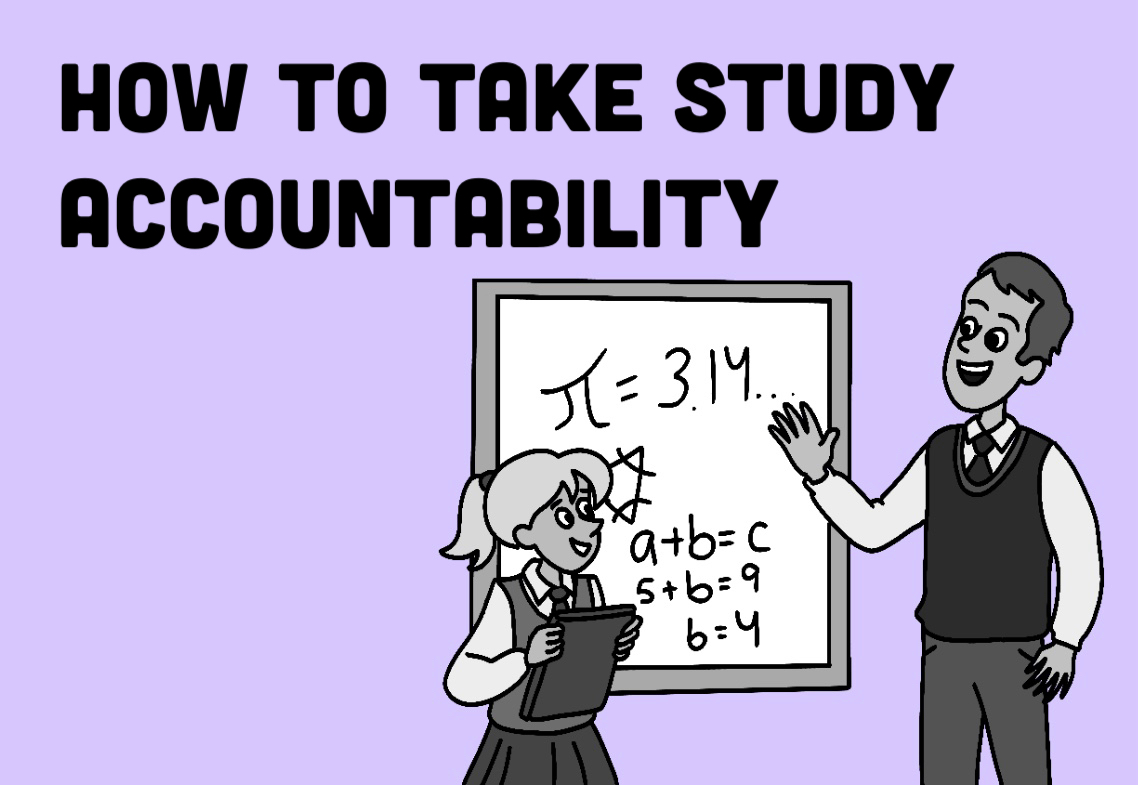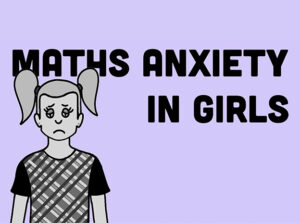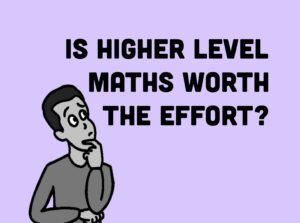WhatsApp:
+353 87 202 0389
This is a quote that we live by here at Breakthrough Maths: “(Study) accountability is the glue that ties commitment to the result.” – Bob Proctor
We’ll explain all about this in a second, but first – raise your hand if you’ve ever had a teacher that just drives you up the wall.

They may be disorganised, bad at communicating, out of touch with reality, or just a pure briar.
We’ve all had at least one, so we know how frustrating it can be.
But the truth is, there’s no point complaining about teachers that aren’t cutting it – they’re not going anywhere, and the chances of them changing aren’t favourable because most have followed the same teaching style for years.
But all hope is not lost!
Today we’ll be talking about taking study accountability, and how this will help you succeed in your exams whether you’ve got a good teacher or not.
Let’s quickly explain what we mean before going any further.
What does ‘taking study accountability’ mean?
Essentially, taking study accountability means taking responsibility for the trajectory of your own education. It means being self-sufficient and independently making sure you get where you need to be, no matter what else is going on around you.
It’s an incredibly valuable life skill, and it becomes more important every year you spend in education. Teachers become less involved as you move from primary school to secondary, and if you go to college, you’ll pretty much be the captain of your own ship.
You need to learn pretty fast how to take study accountability because you will eventually get too old to be babysat!
So today, we’re showing you some tough love by giving you our top tips for how to take study accountability in your education.
The student becomes the teacher
In our last post, we talked about the book What Smart Students Know by Adam Robinson. It’s a great book to read if you are trying to deal with a bad teacher.
One of the standout principles outlined in his book is that you are your own best teacher. It sounds like a reach, but he is raising a great point.
You might still be playing the ‘pin the blame on the teacher’ game and whining that it’s their job to teach, but taking accountability means accepting the reality that things won’t change by themselves and that sometimes *cringes* you have to be the change you want to see in the world.
If you’re not happy with your teacher, become your own teacher. It’s a lot easier than you think.
Everything on the Leaving Cert and Junior Cycle curriculums was carefully selected so that it is not out of bounds for students of the relevant age and education level. There is no rocket science on the syllabus, so even the toughest concepts examined are considered comprehensible.
That means that there is little you won’t be able to conquer once you have the right approach.
Think about what your favourite teacher does that makes that subject so much more enjoyable and understandable.
Do they read things aloud to you in class? (maybe they have a really strong Sligo accent that haunts your waking nightmares?)
Do they talk through the examples shown in the book, or past exam questions, and break them down step by step?
Do they make mindmaps or Powerpoint presentations?
Do they set weekly tests?
Do they gamify their lessons?
Once you’ve figured out what works for you, try channelling it yourself! Even if it means you spend every evening talking to yourself for an hour, making presentations, or playing Kahoot, it won’t go astray. Active learning is rarely easy or quick, but it’s one sure way of completely understanding something.
And you’ll be fierce proud of yourself if you manage to crack a tricky concept before your teacher could!
The more you practice your self-teaching, the better you become at it, and the more enjoyable it becomes. You’re learning for yourself and not for anyone else.
In saying that, we know that some students struggle with learning difficulties and that self-teaching may not work for some. But that doesn’t mean you can’t find other ways to learn independently!
Money isn’t everything
If your teacher can’t teach, and you’re struggling to teach yourself, don’t panic. There are plenty of other people out there who will be able to teach you everything you need to know, and they’re a lot closer than you think.
The best part about growing up in the digital age is that there are quite literally millions of resources available online at the push of a button.
And so many are free.
Gone are the days when you would have to drag yourself to the local library to find additional resources, sneezing as you turn the pages of a dusty almanac that uses unnecessarily long words. You will find everything you need to succeed with a quick Google Search.
And the best part about taking study accountability using this approach is that you can tailor it to your own learning style!
If you learn best by reading or writing, try using sites like LitCharts, where there are great notes and quote banks for seemingly every novel under the sun, Quizlet, where they have any amount of flashcards for you to go through, or 625Points, where they have some excellent sample answers that you could try rewriting in your own words. We actually have some pretty epic notes ourselves on every maths topic on the Irish curriculum!
If you’re a visual learner, try watching YouTube videos from channels like Crash Course and Khan Academy. But you don’t even need to subscribe to giants in the e-learning industry to find engaging and informative content – just search whatever it is you need, and there’s bound to be someone somewhere who has made a video explaining the concept really well.
If you’re an audio learner, you will definitely find some great podcasts out there, especially for things like History, English, and foreign languages, but we’ve also found that Spotify has a good few podcasts to help you with maths! All you have to do is just plug in your headphones and surrender to the music!
If you work well with short-term goals, gamified learning could be the way to go. In our maths grinds we love using Kahoot, but you’ve also got Duolingo, a great app for improving your language skills, and Studyclix quizzes, which are really handy for theory-based subjects like Biology or Home Ec.
And that is just the tip of the iceberg. Taking study accountability doesn’t always have to be teaching yourself by yourself, it’s also about knowing when and where to look for help and seeking it independently.
There are so many more amazing websites, videos, podcasts, and games out there that will help you succeed, and so many brilliant teachers who have found ways to share their passion for the subject beyond the classroom, free of charge.
…but it’s always wise to invest in your education
In the lead-up to big exams, there may come a point where you don’t find yourself with enough time to self-teach one subject on top of studying all of the rest.
Or perhaps the free resources you were depending on suddenly introduced a ‘Premium’ subscription that would be so much more helpful to you.
In these situations, it may be a good shout to consider making an investment in your education.
Now, we’re not suggesting you try to enroll in an expensive boarding school to solve your problems (believe it or not, there’s no real difference in the grades achieved between kids in public and private schools).
You don’t need to spend six hundred euros a week to get 600 points. You can succeed off much less than that.
Chat with your parents and see what’s within budget. There are very few parents who will deny their kids something that will really benefit them if they can afford it.
But, if you’re really struggling to close the deal, offer to make some sort of contribution towards it. Taking a packed lunch to school instead of getting the Tesco meal deal will be well worth it if you can put that money towards something that will help you get the grades you need.
Taking accountability for your education means acknowledging that making an investment in it is always worthwhile.
Plus, a lot of these subscription-based services take a monthly payment that works out very reasonably once you spread it out over 4 or 5 weeks. Take Breakthrough Maths grinds for example:
- We offer weekly, hour-long grinds with young and enthusiastic tutors who achieved H1 grades in their own Leaving Cert and continued to excel in STEM fields afterward. Our tutors know their stuff but can also communicate it in a way that is engaging and a bit of craic!
- We store notes on every single topic, as well as recordings of lessons you might have missed so that you never fall behind. You can replay our lessons as many times as you need!
- We offer 24/7 support to students via SupportSapp, where you can send us photos of tricky questions from the textbook or exam papers, and we will provide a detailed video response showing you exactly how to do it!
All of this for a mere €38 a week after your free trial, and what’s €38 between friends?
It takes a village to raise a grade
If you find this particular teacher to be particularly bad, the odds are your friends share that same opinion.
So why don’t all of you take some study accountability, work together, and teach each other?
It’ll be a bit of craic, it’ll take the heat off your own neck trying to do it all yourself, and you might actually find it easier to learn off your mates.
Again, ye will be in the driving seat, so ye can develop your own lesson plan and teaching style. There will also be no one stopping you from having a snack while you work!
Plus, they say that once trying to explain a concept to a peer helps you understand it better yourself – a win-win scenario if you ask us!
Group work is a huge part of the Junior Cycle curriculum, and indeed, a huge part of adult life. Developing these skills now will serve you in the short and long term, and it’ll be much less painful trying to survive the year with a bad teacher with a little help from your friends.
The role of your parents
But your friends aren’t the only people who can help you deal with a substandard teacher – your parents have a big part to play in this too.
That’s right folks – your folks have to take some accountability too.
Not all of us have the ability to sit at the kitchen table and work out sums with kids without it ending in a screaming match – and that’s okay! But you do need to be willing to give them as much support as possible and try to provide alternative methods to help your child succeed in the problem subject.
We’ve talked about a lot of the different resources available to your kids, but sometimes it will be up to parents to get their kids set up with a subscription or a grinds teacher. Kids can’t always be expected to be proactive or entrepreneurial, and they have lots of other subjects they’re trying to manage as well.
If you are a busy parent who has a million and one different things to do before searching for a grinds teacher and making sure your child does their studies, then Breakthrough Maths might just be the trick.
- We maintain constant contact with parents, sending you reminder notifications on WhatsApp before the lesson begins, as well as one if your child doesn’t join the grind.
- You can contact us on WhatsApp or via email with any issues relating to the grinds and we will quickly reply with a solution to your problems.
- We are also happy to schedule a call with a member of our team to deal with more complicated matters and support you as you support your child.
Taking study accountability isn’t easy, but it’s a lot more productive than playing ‘pin the blame on the teacher’. It’ll not only help you succeed in the exams but in life beyond school.
Stay tuned for more study tips!
T.J – CEO of Breakthrough Maths.

Book a Free Trial Grind. It will be the perfect tonic before the Summer tests!




